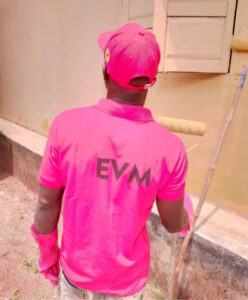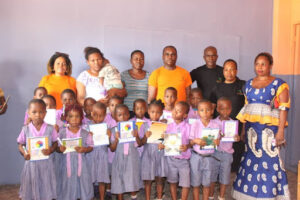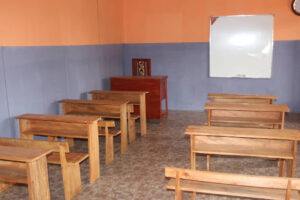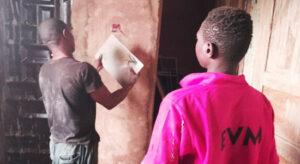Our History
How It All Began… The Eye Opener
 Every Village Matters was born out of one woman’s dream for positive shift in mindset of the rural people from economic dependency to socio-economic advancement and prosperity which is achievable through mutual cooperation and strategic empowerment of local people.
Every Village Matters was born out of one woman’s dream for positive shift in mindset of the rural people from economic dependency to socio-economic advancement and prosperity which is achievable through mutual cooperation and strategic empowerment of local people.
It was August 2018. For the first time seven years after relocating to the UK, Niki Fredrick visited Amaimo, her village in Southeast Nigeria. Niki was devastated to see an incredibly high level of social infrastructural degradation in the community. So many of the local structures originally built by the government and churches were now aged and in ruins with little or no maintenance. Most had become unfit for purpose. It was this eye-opening visit that inspired Niki to make a landmark decision that changed her life’s trajectory.
The Need

During that visit to her village, on 25th August, Niki invited a few children from her close family for a small event to mark her son’s birthday. She had a small birthday cake, some food and few drinks for about 20 children but went into a panic when probably every child from the entire village turned up!
There wasn’t enough food to go round the multitude of children and she had made up only a few party bags. Then came the big scramble for the story books, toys, and writing materials in each loot bag and so the presents in the bags had to be split into several peices to go round.
The next day, Niki was moved to tears to hear from the father of one of the kids at the party that his child had been so excited with the fancy pen he had received at the party that he went to sleep hugging the pen close to his heart.
This was a humbling moment for Niki. She felt compelled to pay closer attention to the plight of children in the community and began to notice the spate of school buildings with leaking, wind-thorn roofs and classrooms with no windows, doors, nor basic furniture. Most of the schools lacked toilet facilities and potable water. She also found that many of the school children had to bring in their own desks to school each day, walking barefoot to school in torn uniforms with no books or school bags. Some could not enrol into school and many were dropping out due to inability to pay school fees. Others left simply because the school environment and learning standards offered little or no attraction or hope.
And so they stayed home or hung about on the streets, many of them growing up jobless and unskilled with limited life prospects, some forced into crime to survive
On further research, Niki discovered that this was, unfortunately the same situation for many rural communities across Nigeria and Sub-Saharan Africa, one which has led to shocking numbers of out-of-school children, the highest globally- the story of poverty and dependency in Amaimo and across Sub-Saharan Africa is not new. Before embarking on her trip to Nigeria, Niki had already been remitting money to Nigeria, as is now customary for many African diasporas who support family and friends back home with children’s school fees, medical bills, house rent, capital to start a business, and other pressing needs.
Niki Fredrick
My Vision
I dream of a future where dependency gives way to interdependency across rural Sub-Saharan Africa; a time when everyone has something to offer to their community: a skill, a trade, a know-how.
I see sustainable development for rural communities – a culture of mutual cooperation propelled by social awareness and consciousness; economic growth driven by an entrepreneurial spirit; enlightenment and self awareness made possible through good quality and easily accessible education.
And all these leading to social security, peace and prosperity…
I long for a time when young people need not migrate to urban cities to make a living, a time when older people may retire from the noise and bustle of the metropolis to the peace and serenity of the countryside.
My vision is for a time when no man or woman in our rural communities lacks the capacity to provide for their children, and no child or young person is out of school because of poverty or ignorance; when children may read as many story books as their young hearts desire, have access to a safe place to play and let their imagination run wild, with the freedom to choose who and what they become – the very best version of themselves…
I long for peaceful and prosperous Sub-Saharan African villages where anyone from anywhere in the world can travel safely and reside securely.
I dream all these because Every Single Person in Every Village Matters!
Call to Action
Fast forward to May 2019 and few months after her trip to Nigeria, Niki met with four of her friends: Pastor Wayne Clarke, Rachel Foakes, Gifty Yakubu, and Jacintha Maseli to help set up Every Village Matters. Later in September 2019, she quit her job as Finance and Admin Officer of a Manchester-based charity to enrol into a masters degree programme in International Development. On graduation from the course in which she majored in Poverty, Inequality & Development, Niki finally decided to leave her accounting profession for a career in Development and humanitarian work.
After initial delays due to the COVID-19 pandemic, Every Village Matters was legally registered in Owerri, Southeast Nigeria, on the 22nd of June 2021 with a critical decision to start from the grassroots and rural youth empowerment through primary education and youth skills training.
First Partnership and Projects
 Since our first official visit to Amaimo where we were warmly received by the Parish Priest of St Columbus Catholic Parish, we have gone on to establish a cordial, strategic relationship with the community. Our partnership was backed up with an MOU with the lead school, Holy Rosary Model Nursery/Primary School under the supervision of the Catholic Parish. By this agreement, we were provided a land and hall space to construct play and educational facilities to benefit every child and young person in Amaimo and beyond. Our construction on this site has however been discontinued due to an-going project near the site that has rendered it unfit for our purpose.
Since our first official visit to Amaimo where we were warmly received by the Parish Priest of St Columbus Catholic Parish, we have gone on to establish a cordial, strategic relationship with the community. Our partnership was backed up with an MOU with the lead school, Holy Rosary Model Nursery/Primary School under the supervision of the Catholic Parish. By this agreement, we were provided a land and hall space to construct play and educational facilities to benefit every child and young person in Amaimo and beyond. Our construction on this site has however been discontinued due to an-going project near the site that has rendered it unfit for our purpose.
Fortunately, a new site, located at Obodo Community Primary School, has been provided by the Obodo community in conjunction with Ikeduru Local Government Council to enable us continue with the project.
 Prior to this, we renovated six classrooms for the primary school as our first courtesy project and have gone on to do a data collection survey of six other primary and three secondary schools to establish what are the most pressing challenges of the community’s children and young people to going to school. Our survey enabled us to design a scholarship programme aimed at enrolling 420 children into primary school across Amaimo within six years of the programme.
Prior to this, we renovated six classrooms for the primary school as our first courtesy project and have gone on to do a data collection survey of six other primary and three secondary schools to establish what are the most pressing challenges of the community’s children and young people to going to school. Our survey enabled us to design a scholarship programme aimed at enrolling 420 children into primary school across Amaimo within six years of the programme.
 Not to neglect the young people who have already dropped out of school with limited skills and employment prospects, we designed a skills training scheme that empowers young people and local tradespeople. The scheme aims to invigorate the local economy and also get the young people off the streets and postively engaged in an enterprise.
Not to neglect the young people who have already dropped out of school with limited skills and employment prospects, we designed a skills training scheme that empowers young people and local tradespeople. The scheme aims to invigorate the local economy and also get the young people off the streets and postively engaged in an enterprise.
Although our focus is on the reduction of poverty and dependency in Sub-Saharan Africa, our organisation is a global one. And so with the expansion of our membership to residents of US and other countries, we have now achieved the registration of Every Village Matters in the US on 9th June, 2023. This has enabled us to increase our fundraising capacity. We believe it will further widen our membership scope and we look to harnessing strategic collaborations with members of the communities we will serve to upscale our work to Ghana, Sierra Leone, Uganda, and other countries across Sub-Saharan Africa.

